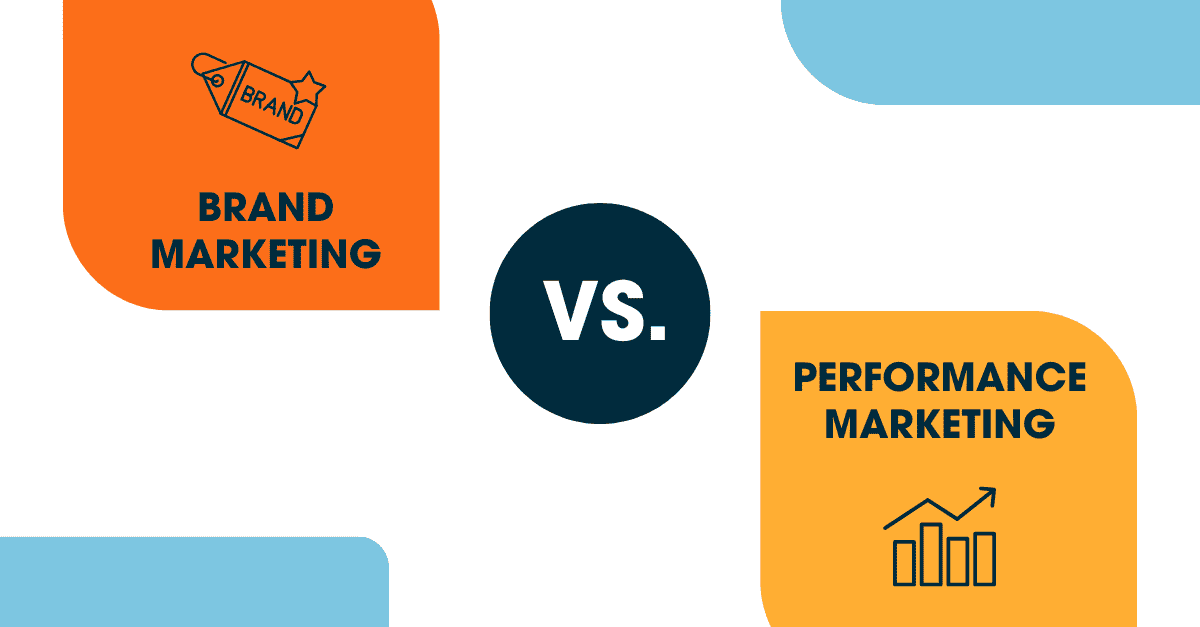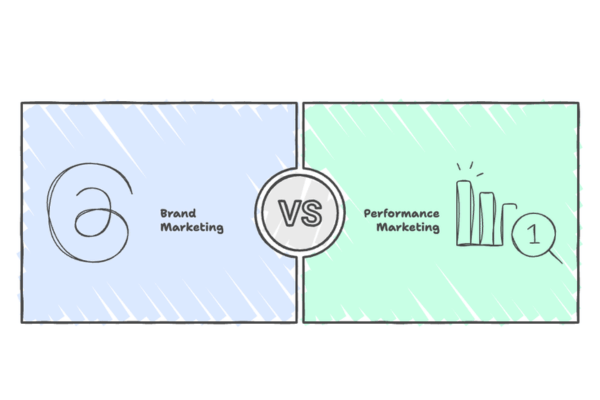
Brand Marketing vs Performance Marketing: Key Insights
Marketing isn’t just about getting your name out there—it’s about making an impact that lasts. But how do businesses decide where to focus their efforts? Some play the long game, shaping their reputation and staying top-of-mind. Others double down on immediate, measurable results.
This is where brand marketing and performance marketing take center stage. One builds trust and recognition over time, while the other relies on data to drive instant conversions. Both have their strengths, and choosing the right marketing approach can define how a business grows.
So, what sets them apart? And how do companies strike the right balance between the two? This guide breaks it all down—key differences, real-world examples, and when to use each strategy for maximum impact.
Keep reading—you won’t want to miss this.
What is Brand Marketing?

Brand marketing is more than just selling a product—it’s about shaping perception, building trust, and creating an emotional connection with an audience.
A strong brand presence makes businesses recognizable, memorable, and preferred over competitors.
In fact, 64% of consumers say they are drawn to brands that share their values, showing how much identity matters in today’s marketplace.
Unlike direct-response marketing, which pushes for immediate sales, brand marketing plants the seeds for long-term success. Companies invest in their identity, ensuring customers don’t just buy a product but buy into a vision.
Take Nike and Apple, for example. They aren’t just selling shoes or smartphones; they are selling innovation, aspiration, and a sense of belonging. Their campaigns rarely focus on a single product but instead reinforce the ideals that define their brand.
A successful brand marketing strategy relies on a few core elements.
Brand storytelling shapes the company’s narrative, while consistent messaging and visuals—logos, colors, and tone—build familiarity. Public relations and media coverage keep the brand relevant, and content marketing through blogs, videos, and educational materials fosters engagement.
These efforts create a lasting impression, making customers return not just for the product but for what the brand represents.
As Simon Sinek famously said, “People don’t buy what you do; they buy why you do it.” This is the foundation of effective brand marketing everywhere. Companies that successfully communicate their “why” cultivate a loyal audience, ensuring that when a customer is ready to make a purchase, their brand is the first that comes to mind.
What is Performance Marketing?

Imagine only paying for marketing when it delivers actual results. That’s the power of performance marketing—a strategy built entirely on measurable actions like clicks, leads, and sales.
Unlike brand marketing, which nurtures long-term relationships, performance marketing is data-driven, focusing on immediate returns. No fluff, just results.
And it works—companies using performance marketing see an average 200% ROI from paid ad campaigns.
At its core, performance marketing is about efficiency.
Every CPA marketing campaign is designed to optimize ad spend, ensuring businesses get the most value for their investment. Marketers track key metrics in real-time, adjusting strategies to improve conversion rates and drive high-quality traffic.
Whether through Google Ads, paid ads, or affiliate programs, this approach ensures brands reach the right target audience at the right time.
Several moving parts make up a strong performance marketing strategy. Paid advertising through social media platforms like Google Ads and Facebook Ads helps businesses place their message directly in front of potential buyers.
Affiliate marketing and CPA networks expand reach by partnering with third-party publishers who promote products through affiliate links. Meanwhile, SEO and conversion rate optimization ensure that organic traffic flows steadily, converting visitors into paying customers.
Finally, data tracking tools like Google Analytics and Meta Pixel help refine strategies, maximizing efficiency and minimizing wasted spend.
Performance marketing isn’t about hoping for results—it’s about making them happen.
With the right mix of CPA campaigns, affiliate networks, and ad creatives, businesses can turn marketing efforts into a steady stream of revenue, scaling faster while staying in control of their marketing budget.
Key Differences Between Brand Marketing and Performance Marketing
While performance and brand marketing serve different purposes, they are both essential to a well-rounded marketing strategy.
One builds recognition and trust over time, while the other focuses on immediate, trackable results. Understanding their differences helps businesses allocate their marketing efforts wisely, ensuring both long-term growth and short-term success.
Brand Marketing vs. Performance Marketing: A Side-by-Side Comparison
| Feature | Brand Marketing | Performance Marketing |
|---|---|---|
| Objective | Long-term brand awareness and loyalty | Immediate conversions and measurable actions |
| Timeframe | Long-term (months/years) | Short-term (days/weeks) |
| Metrics | Brand sentiment, recognition, engagement | Clicks, conversions, ROAS (Return on Ad Spend) |
| Examples | Nike’s “Just Do It” campaigns, Apple’s storytelling ads | Google Ads for lead generation, Facebook Ads for e-commerce sales |
| Best For | Establishing trust, long-term audience retention | Driving immediate sales, scaling revenue |
Data supports the power of both strategies.
While performance marketing drives faster ROI, brand marketing increases customer lifetime value (LTV) by up to 60%.
Additionally, 77% of marketers believe that a strong brand leads to higher long-term growth, even though performance marketing delivers immediate CPA campaign results.
Neither strategy works in isolation—businesses that integrate both approaches create a sustainable path to growth.
Pros and Cons of Brand Marketing vs. Performance Marketing

Every marketing strategy comes with trade-offs. Some brands pour resources into crafting an identity that resonates with consumers, ensuring they stand the test of time. Others focus on fast, data-driven growth, optimizing every campaign for maximum returns.
But which approach delivers the best results? The answer isn’t always straightforward.
Both brand and performance marketing have distinct advantages and limitations. One builds recognition and loyalty, ensuring customers return without the need for constant advertising.
The other drives immediate action, turning clicks into conversions almost instantly.
Understanding their pros and cons helps businesses decide where to invest for the best long-term impact.
Pros of Brand Marketing
- Builds long-term trust and loyalty – Around 80% of consumers are more likely to buy from brands they recognize and trust. A strong brand presence makes future conversions easier and more organic.
- Creates an emotional connection – Customers don’t just buy products; they invest in brands that align with their values and identity. Emotional branding leads to deeper engagement.
- Boosts brand recall and recognition – A well-established brand remains top-of-mind, reducing the need for constant ad spend to attract new customers.
Cons of Brand Marketing
- Takes longer to see measurable results – Unlike performance marketing campaigns, which can generate leads instantly, brand marketing is a slow-burning strategy that unfolds over time.
- Harder to track immediate ROI – While key marketing metrics like engagement and brand sentiment are measurable, direct sales impact can be less tangible.
Pros of Performance Marketing
- Delivers immediate, measurable results – With strategies like Google Ads, CPA campaigns, and affiliate programs, businesses can track clicks, conversions, and revenue in real time.
- Optimizable for higher efficiency – By analyzing conversion rates and campaign metrics, marketers can fine-tune ads, keywords, and budgets for better performance.
- Works well for scaling lead generation and sales – Businesses looking to drive traffic quickly can use affiliate marketing, CPA offers, and paid ads to reach a highly targeted audience.
Cons of Performance Marketing
- Can become expensive over time without brand loyalty – Without a solid brand foundation, businesses must constantly spend on ads and partnerships to attract new customers.
- Less effective without a strong brand presence – A CPA marketing model relies on compelling offers, but consumers may hesitate to convert if they don’t trust the brand behind the promotion.
How to Combine Brand Marketing and Performance Marketing for Maximum Growth?
Focusing solely on one marketing approach—whether it’s brand marketing or performance marketing—can limit a company’s business growth.
A business that leans too heavily on performance marketing risks becoming overly dependent on paid ads and short-term wins.
On the other hand, companies that invest only in brand marketing may struggle to see immediate returns.
The sweet spot? Finding the right balance between the two—leveraging CPA campaigns for quick conversions while strengthening brand presence for long-term impact.
Leverage Performance Marketing for Immediate Gains While Building Brand Trust
A balanced marketing strategy doesn’t mean choosing between brand marketing and performance marketing—it means knowing how to use both effectively.
While performance marketers optimize marketing campaigns for quick returns, they can also incorporate long term brand building activities to create a consistent brand image.
For instance, instead of running generic Google Ads, brands can infuse their brand message into their social media campaigns and search engine marketing efforts.
This not only helps to generate leads but also strengthens brand value, making future marketing efforts more effective. Harvard Business Review notes that companies with a strong brand identity see greater long-term stability, even when ad spend fluctuates.
Use Brand Marketing to Increase Conversions in Performance Campaigns
Brand marketing focuses on creating an emotional connection, and that directly influences performance marketing metrics.
Research shows that ads integrating a brand story convert 30% better than direct-response ads that lack identity.
Consumers engage more when they recognize a brand’s values, making them more likely to take action on social media advertising, influencer marketing, and other digital channels.
Businesses can also use valuable and relevant content in content marketing and search engine optimization to enhance brand perception.
A well-crafted brand marketing strategy ensures that consumers don’t just respond to a one-time offer but develop a lasting relationship with the brand.
Track Both Short-Term and Long-Term Metrics
To truly measure success, businesses must monitor both brand marketing and performance indicators.
- Brand marketing metrics – Brand perception, positive brand image, and customer loyalty. These show whether brand marketing campaigns are strengthening long-term brand value.
- Performance marketing metrics – Conversion rate optimization, ROAS, and cost-per-lead. These ensure performance marketing relies heavily on data to optimize campaigns effectively.
Boost Your Performance Marketing with YepAds
When it comes to boosting business performance, performance marketing is one of the most effective strategies you can adopt. It focuses on measurable, data-driven results, allowing you to track progress, optimize your efforts, and ensure that your marketing dollars are working hard for you.
At YepAds, we specialize in delivering results through our tailored performance marketing services. With our advanced tracking tools and data-driven insights, we empower you to optimize every aspect of your campaign to ensure maximum ROI. Our team works closely with you to craft a strategy that fits your unique business goals, whether you’re new to performance marketing or looking to refine your approach for even better results.
We’re committed to your success. Our transparent and reliable service ensures that your marketing strategy is in capable hands, allowing you to scale effectively and achieve long-term growth.
Get started with YepAds today! Join YepAds now and elevate your performance marketing to new heights.
